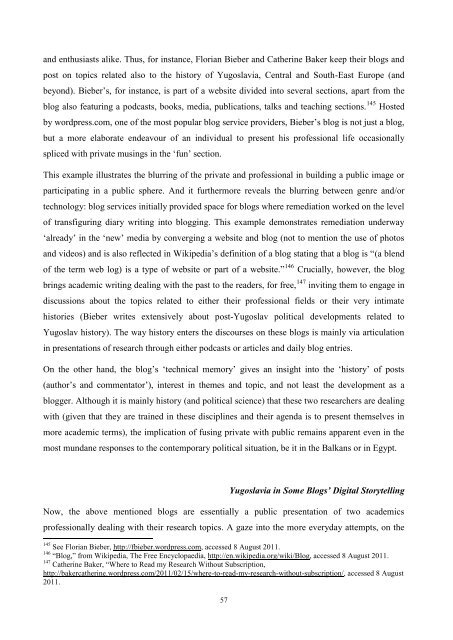UNIVERSITY OF NOVA GORICA GRADUATE SCHOOL ...
UNIVERSITY OF NOVA GORICA GRADUATE SCHOOL ...
UNIVERSITY OF NOVA GORICA GRADUATE SCHOOL ...
You also want an ePaper? Increase the reach of your titles
YUMPU automatically turns print PDFs into web optimized ePapers that Google loves.
and enthusiasts alike. Thus, for instance, Florian Bieber and Catherine Baker keep their blogs and<br />
post on topics related also to the history of Yugoslavia, Central and South-East Europe (and<br />
beyond). Bieber‘s, for instance, is part of a website divided into several sections, apart from the<br />
blog also featuring a podcasts, books, media, publications, talks and teaching sections. 145 Hosted<br />
by wordpress.com, one of the most popular blog service providers, Bieber‘s blog is not just a blog,<br />
but a more elaborate endeavour of an individual to present his professional life occasionally<br />
spliced with private musings in the ‗fun‘ section.<br />
This example illustrates the blurring of the private and professional in building a public image or<br />
participating in a public sphere. And it furthermore reveals the blurring between genre and/or<br />
technology: blog services initially provided space for blogs where remediation worked on the level<br />
of transfiguring diary writing into blogging. This example demonstrates remediation underway<br />
‗already‘ in the ‗new‘ media by converging a website and blog (not to mention the use of photos<br />
and videos) and is also reflected in Wikipedia‘s definition of a blog stating that a blog is ―(a blend<br />
of the term web log) is a type of website or part of a website.‖ 146 Crucially, however, the blog<br />
brings academic writing dealing with the past to the readers, for free, 147 inviting them to engage in<br />
discussions about the topics related to either their professional fields or their very intimate<br />
histories (Bieber writes extensively about post-Yugoslav political developments related to<br />
Yugoslav history). The way history enters the discourses on these blogs is mainly via articulation<br />
in presentations of research through either podcasts or articles and daily blog entries.<br />
On the other hand, the blog‘s ‗technical memory‘ gives an insight into the ‗history‘ of posts<br />
(author‘s and commentator‘), interest in themes and topic, and not least the development as a<br />
blogger. Although it is mainly history (and political science) that these two researchers are dealing<br />
with (given that they are trained in these disciplines and their agenda is to present themselves in<br />
more academic terms), the implication of fusing private with public remains apparent even in the<br />
most mundane responses to the contemporary political situation, be it in the Balkans or in Egypt.<br />
57<br />
Yugoslavia in Some Blogs’ Digital Storytelling<br />
Now, the above mentioned blogs are essentially a public presentation of two academics<br />
professionally dealing with their research topics. A gaze into the more everyday attempts, on the<br />
145 See Florian Bieber, http://fbieber.wordpress.com, accessed 8 August 2011.<br />
146 ―Blog,‖ from Wikipedia, The Free Encyclopaedia, http://en.wikipedia.org/wiki/Blog, accessed 8 August 2011.<br />
147 Catherine Baker, ―Where to Read my Research Without Subscription,<br />
http://bakercatherine.wordpress.com/2011/02/15/where-to-read-my-research-without-subscription/, accessed 8 August<br />
2011.

















